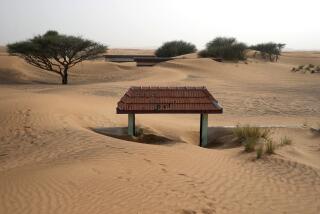Gulf War’s Silver Lining: Business Booms in Dubai
- Share via
DUBAI, United Arab Emirates — The building is an anomaly in freewheeling Dubai. Above the entrance are a red, white and green flag and a sign saying, “Please pay attention, Islamic veil is essential for entrance.”
With a portrait of the Ayatollah Ruhollah Khomeini over the door and nurses in starched white Islamic chadors, this is the Iranian hospital in Dubai, just one sign of Iran’s continuing influence on the Arab side of the Persian Gulf, despite Iran’s long-running war with Iraq.
From Kuwait and Bahrain to the United Arab Emirates, large Shia Muslim populations look to Iran for spiritual leadership as the only country, though not Arab, where Shias are a controlling majority.
“We like Khomeini for his religion but not his politics,” a Shia taxi driver in Bahrain said recently.
Published estimates suggest that 30% of Kuwait’s population is Shia, 60% of Bahrain’s, 5% of Saudi Arabia’s and 10% of the population of the United Arab Emirates.
A mosque in Dubai has been established, with local Shia funds, and is tended by “the Imam’s representative,” the Imam being Khomeini.
“We try to stay out of politics and just deal with religious questions,” said Sayyid Reza Borgei, assistant director at the mosque. “People seek our help with family problems and matters of marriage.”
In addition to the religious ties, Dubai and neighboring Sharjah both have large numbers of Iranians. Dubai alone has an estimated 50,000 Iranian nationals.
The tiny emirates tend to support the Arab view in the gulf war. They recently condemned Iran for its missile attacks against Kuwait. And the emirates were furious when Iran planted mines last month off the port of Fujaira, ruining business there.
Despite the political implications, ties with Iran remain strong, although mostly on the commercial level.
“Dubai has been trading with Iran for thousands of years,” a Western economist said. “It isn’t about to let a little thing like the gulf war stop that.”
He noted that two years ago, Saudi Arabia displaced Iran as Dubai’s leading trading partner but that Iran won back its leading position last year. In the first half of this year, trade between Dubai and Iran is up 40% over 1986’s first half.
“The Iranian appetite for consumer goods is absolutely insatiable,” the Western economist said.
The hot items in Iran are American cigarettes, whiskey, video cassettes, waterproof American jackets and blue jeans. A video player, banned in Iran, costs $400 here and can be sold in Iran for $1,200.
There are 21 passenger flights a week between Iran and Dubai, and all of the seats are booked three months in advance by Iranians planning shopping trips in Dubai.
“If this war ever ends,” one dealer said, “Dubai will be swept clean of goods by the Iranians.”
More to Read
Sign up for Essential California
The most important California stories and recommendations in your inbox every morning.
You may occasionally receive promotional content from the Los Angeles Times.










